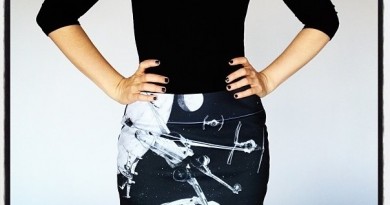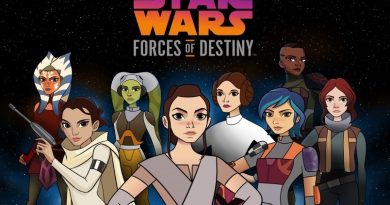Fangirls Around the Web: June 28, 2014
 Fangirls Around the Web is a bi-weekly series where we highlight fangirls and their real and fictional heroines spotted around the web.
Fangirls Around the Web is a bi-weekly series where we highlight fangirls and their real and fictional heroines spotted around the web.
Feminism, Strong Female Characters and Storytelling
At The Dissolve, Tasha Robinson wrote an interesting essay titled “We’re losing all our Strong Female Characters to Trinity Syndrome,” focusing on Valka, the mother of the protagonist Hiccup in How To Train Your Dragon 2. At the Daily Dot, Aja Romano responds with “Why ‘How to Train Your Dragon 2’ is a radical feminist triumph.” When I first read Robinson’s piece, I felt the standard for strong female character was unreasonable, and Romano’s rebuttal eloquently makes many of the points floating around in my mind. It’s notable too that she uses Tumblr, a social media tool that has allowed women to share their opinions widely, as a resource. Finally, Pershephone Magazine’s article “A Feminist Character =/= A Character Who Is Feminist” shines more light on the topic of feminism and characters.
The New York Times reports on the Kilroys, an advocacy group of women playwrights and producers, who are challenging theaters to stage more plays by women.
CJ Daughterty at The Guardian asks “Should Boys Read Boys?” or more books written by women, too.
Anita Sarkeesian at Feminist Frequency has another new video, this time focusing on Women as Background Decoration.
Liz Ohanesian at LA Weekly asks “Why Aren’t There More Women in the Video Game Industry?” After word that female playable characters will not be an option in the new Assassin’s Creed game, Insomniac Games announced that women characters will be an option their game Sunset Overdrive – and took a potshot at Ubisoft in the process.
STEM: There Are Still Ceilings
Chelsea Clinton, on behalf of the Clinton Foundation global initiative No Ceilings discussed the STEM gender divide with TIME.
In 1984, 37% of computer-science degrees went to women. Now only 12% of computer science graduates are women. This divide explains why the Clinton Foundation’s No Ceilings initiative wants to find a solution to one of the largest remaining gender gaps in America. “We’re looking from 1995 until 2015 as to where women and girls have gained in terms of rights and opportunities around the world and in the United States and where gaps still persist. And STEM around the world but acutely here in the U.S. is an area where not only the gap remains but the gap has widened in the last 20 years,” Clinton told TIME.
In an effort to encourage girls, Clinton hosted From STEM to Success: A No Ceilings Conversation on Monday in Denver, Colo. The panel was moderated by Kari Byron, co-host of Mythbusters, and included Debbie Sterling, creator of GoldieBlox—an engineering toy for girls—and Danielle Feinberg, director of photography and lighting at Pixar. The women spoke about their individual struggles and how the culture and school system needs to change to support women interested in math and science.
Sterling notes in the panel that young children, when asked to draw a scientist, will generally depict a white male. It is a combination of influences that convince children that white male is a default. A recent Mic article on a Verizon advertisement highlights the subtle way parents and teachers can push young girls away from science and math. It is also media representation of women that perpetuates the cycle.
Read The Daily Dot Daily
The Daily Dot featured several great articles recently. Alicia Switz writes about “Yes, the ‘Maleficent’ rape scene matters for all women.” Gavia Baker-Whitelaw and Aja Romano wrote the brilliant essay “A guide to fanfiction for people who can’t stop getting it wrong.” Dennis Scimeca reports that “Aisha Tyler has some choice words for girl-hating gamers.” And Lisa Grandshaw lets us “Meet the writer behind the first female-focused ‘Transformers’ comic.”
In addition, Michelle Jaworski conducted a fabulous interview with comics writer Kelly Sue DeConnick. Here are some highlights:
With projects like We Are Comics gaining traction and more people speaking out against the sexism in geek and comic book culture. How do you think that it’s making a difference?
It’s too soon to tell, I think.
I want to point something out here though—comics used to be for everyone. This absurd notion we have now that comics are for dudes is a relatively recent development. This movement—if we can call it that—to open up the readership isn’t a radical shift so much as a restoration.
Women are getting bigger roles in superhero movies (although not one of their own)—yet they are only reduced to how they look in a leather suit or the decision to shave one’s head for the role in interviews. How do we change that conversation?
Call it out. Call it out, call it out, call it out.
At Girls Gone Geek, Lindsey Morris reports the panel “Reimagining the Female Superhero” from the recent Special Edition: NYC convention. Moderated by Ben Saunders, it featured Gail Simone, Amy Reeder, Marguerite Bennett, Emanuela Lupacchino, and Jenny Frison. The full Q&A is worth reading, but I particularly liked this comment:
Saunders used the statistic Reeder gave to segue into his next question. ” I teach these classes on comics,” he began, “and women consistently outnumber men in all of my classes. Girls just read more than boys. What I’ve discovered is – it turns out that girls like action adventure stories, like superhero stories, and always have liked them! But a lot of the female fans that I teach feel that they have to battle with publishers, with store owners, and with, let’s say, certain male-dominated enclaves of fandom, in order to even be taken seriously as members of this fandom.
Wonderful Women of Star Wars
Natacha Guyot on Tumblr shared her amazing video tribute to the women of Star Wars, “Be Everything You Can Be.”
Carrie Goldman at Portrait of an Adoption shares a touching new update, “Aren’t You A Little Short To Be A Stormtrooper? The Passing of the Armor to A Bullied Little Girl,” describing how her daughter Katie has passed along her stormtrooper armor, a donation from the 501st Legion, to Allison, an 11-year-old girl also bullied at school.
Lisa Schap at Eleven Thirty-Eight wrote a great piece, “What Star Wars Can Learn From Arrow.”
The latest Her Universe Fangirls of the Day are: Sasha, Tanya, Jennifer, Sandra, Lauren, Rebecca, Kathy, Katie, Amber, Anna, Sami, Erin, Terri, and Kathleen. This week also included Maria Selke, whose posts have been featured in many editions of Fangirls Around the Web, and two ladies of special note to me: Vanessa Marshall and FANgirl contributor Kay.
This post’s featured Elsa fanart via Calvin Love Internet.
Tricia Barr’s novel, Wynde, won the 2014 Independent Publisher Book Award Gold Medal for Best Science Fiction/Fantasy/Horror Ebook. She was also part of Silence in the Library’s successful all-female creator science fiction and fantasy anthology Athena’s Daughters, which is available now. For excerpts and tales of her adventures in creating a fictional universe, hop over to TriciaBarr.com.
For updates on all things FANgirl follow @FANgirlcantina on Twitter or like FANgirl Zone on Facebook. At times she tries the Tumblr.
- Hyperspace Theories: SKELETON CREW Ahoy! - December 29, 2024
- Hyperspace Theories: WICKED Part I Rises to the Moment - December 6, 2024
- Columbia’s Vader™ Collection Launches Dec 5 - November 27, 2024











Pingback:A Thank You + Links: Feminism, Science Fiction, Writing, Redefining Disability | Natacha Guyot